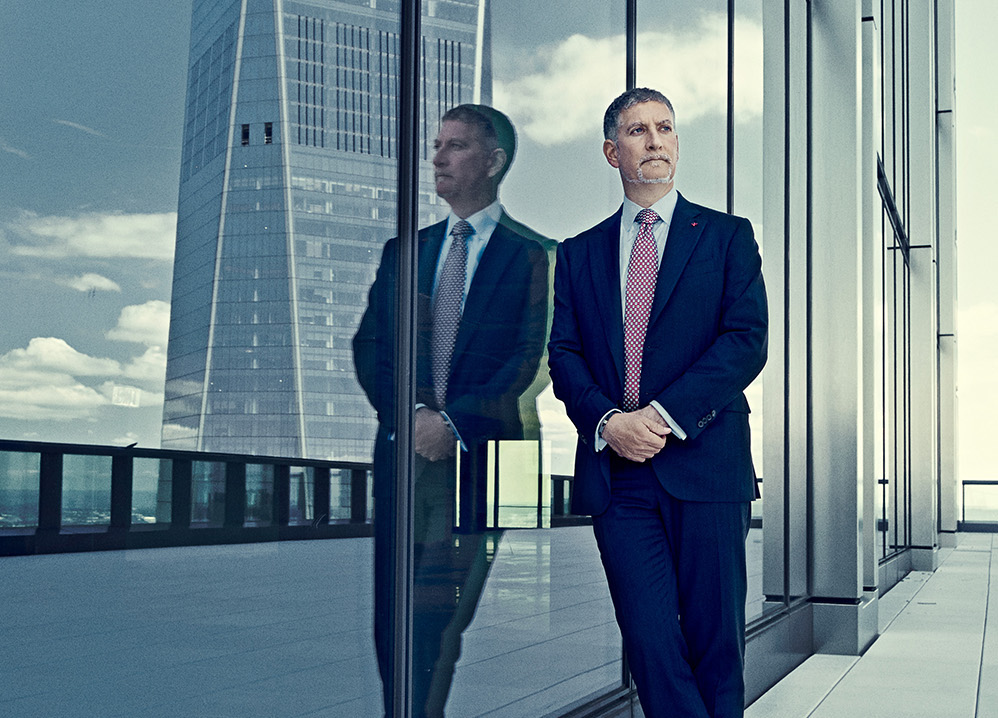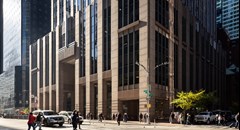By Staff | Mann Report
Marty Burger, CEO of Silverstein Properties, is a force driven by two main passions: his love for real estate and his dedication to Israel and the men and women serving in its armed forces.
Silverstein Properties is perhaps most well-known for being the main developer of the new World Trade Center in New York. Silverstein Properties is a full-service real estate management, investment and development firm responsible for over 40 million square feet of office, residential and hotel properties.
Before joining Silverstein Properties, Burger was president and CEO of his own company, Artisan Real Estate Ventures, founded in 2006. Prior to Artisan, Burger spent 15 years at Related, where he served as president of Related Las Vegas and executive vice president of The Related Companies, L.P. As part of Related, Burger worked on Time Warner Center in New York City, City Place in West Palm Beach and other iconic projects. Burger also spent time at Goldman Sachs’ Whitehall Real Estate funds and The Blackstone Group, working on acquisitions. But it’s development that truly inspires and drives him.
Burger fulfills his other passion—supporting Israel’s soldiers—by contributing to the humanitarian cause of Friends of the Israel Defense Forces (FIDF), a New York-based organization that provides life-changing support for the soldiers of the Israel Defense Forces (IDF). He proudly chaired the FIDF Real Estate Mission to Israel in 2018, and will lead the mission once again this year, taking place from October 27 through November 1.
In advance of the FIDF Real Estate Mission, we sat down with Burger in his office at 7 World Trade Center, to discuss real estate, his commitment to Israel and the IDF soldiers and how he combines those passions.
Commercial Real Estate in Manhattan is Booming
Burger reveals that he is a developer at heart.
“That’s what gets me up in the morning. I love to create things, build new buildings. I’ve had the great privilege across my career to work on some fantastic projects—the World Trade Center, for one,” he says. “This building out the window [of his World Trade Center office] is the Four Seasons Hotel with luxury residences above. It’s called 30 Park Place, a Robert Stern designed building. It’s the tallest residential building in downtown. I had to look at our empty site until we got it financed in 2013 and built. And so, it’s really great to see my own handiwork right outside the window. That’s what gets me up in the morning. That, and my 88-year-old chairman who’s got more energy than anyone.”
Burger’s company has had tremendous success leasing buildings at the World Trade Center, and at record-high rents for downtown. After opening 3 World Trade Center in June, the building is close to 60 percent leased—and 4 World Trade Center and 7 World Trade Center are 100 percent leased. In addition to this, Burger has other buildings downtown that are much older.
“We have leased about eight million square feet in the World Trade Center complex, while Hudson Yards has also leased eight million square feet in that area,” he explains. “So, for a market to lease 16 million square feet in the last five years—that’s the size of some small cities.”
Burger clearly sees positive trends ahead: “I think New York is always going to be a central business district for the global market,” he says. “There’s a requirement for great, new office space. If you think about Goldman Sachs, McKinsey and GroupM, these are all firms that have moved their offices out of old buildings. These companies need new office space to compete for talent, and New York needs new office buildings to compete globally. So that’s what we’re trying to provide.”
At the same time, on the residential side, “there’s been a slowdown in high-priced large condominiums. Four or five years ago, the Chinese, the Russians, the Europeans, the Canadians, the South Americans, everyone was here buying. The U.S. is a safe haven for the world’s money and New York is one of the first places they want to go. But oil prices dropped, China has capital constraints and you have the Russian oligarch scandals, so when you combine all of that, there’s been a slowdown in who was buying big ticket apartments in the city. So, I think there’s an oversupply of very large, expensive units, but there’s still a good market for moderately-priced and moderately-sized apartments in the city. It’s not booming but it’s doing fine. And on the rental side, there’s always a shortage of rental housing in New York City. We control 2,300 apartments with about 5,000 people living on a block on 42nd Street between 11th and 12th Avenues. Our occupancy is in the high 90s percentage-wise and we’re not shy about charging high rents.”
Business Investments in the U.S. and Israel
Burger shares that Silverstein Properties touches Israel in many ways, and through a variety of financial projects.
“We have Israeli investor institutions that invest with us in the United States. Some of the largest pension funds and insurance companies in Israel are partners in three or four office buildings that we’ve done, along with other deals and projects. As such, we have a great relationship with the financial institutions in Israel who are putting money with us in New York and other U.S. markets,” Burger says. “We also launched a bond issue from the Tel Aviv Stock Exchange last May and did a follow up bond issue this past February, so we’ve tapped into the Israeli bond market, and we have hundreds of Israeli investors. It’s all U.S. assets, mostly New York assets, that we are securing and there’s lots of collateral for these bonds. We’re the 32nd company from the U.S. to go down and issue bonds, but we’re the only ones that have been able to do it successfully since May of last year. Our bonds are trading very well in the market.”
Burger explains that Israel is incredibly successful from an economic standpoint, with more patents per capita than anywhere else in the world.
“There’s only so much real estate you can invest in in Tel Aviv or Jerusalem or the rest of the country. The government owns much of it and there’s only so much that’s private. It’s very hard to get developments done for so many reasons,” he says. “So, you have a lot of capital built up there that must go somewhere; it’s got to be invested wisely, so where do you invest? One of the top places they want to be in the U.S. is New York.”
Getting Involved with FIDF
Everyone in the New York real estate market knows that the best way to succeed in business is through networking and personal connections with other key players in the industry. It’s also well-known that many real estate professionals are strong philanthropists. For that reason, Burger would like more of his colleagues to know about the exclusive delegation of real estate leaders he will be taking to Israel this year, a central initiative of the FIDF Real Estate Division.
The FIDF New York Real Estate Division was created in 2006 by a group of successful business and philanthropic leaders who were passionate about uniting members of the real estate community to support the men and women who protect and defend the Jewish State. Since then, this division has helped support several significant capital projects, including the construction of a well-being center at the IDF Revaya Base for the 188th Armored Brigade’s 71st battalion.
Burger got involved with FIDF long after his initial visit to Israel as a young man in 1986.
“I didn’t go back for a while. It was really my involvement with Silverstein Properties that brought me back,” he says. “I went with our president, Tal Kerret. He and I went searching for financial connections. And lo and behold, we ended up becoming partners after that first meeting.”
It was Ofer Yardeni—chairman and CEO of Stonehenge NYC, and an FIDF National Board Member—who established and chaired the FIDF Real Estate Mission to Israel in 2017. This provided top New York real estate professionals with an inside look into the arduous lives of the young Israeli soldiers whose educational, well-being and humanitarian needs they passionately support. In addition to meeting soldiers from all branches of the military, mission participants receive in-depth briefings by senior military and intelligence officers. In 2018, Burger chaired this mission for the first time.
Yardeni was the one who first approached Burger and introduced him to the important work of FIDF.
“Ofer had this idea, together with FIDF National Director and CEO Maj. Gen. (Res.) Meir Klifi-Amir and FIDF Tri-State Executive Director Galit Brichta, to lead a mission of real estate guys,” Burger explains. “As soon as I heard about it, I said ‘I’m in.’ So, I committed. There were 17 of us and we had a great time.”
On the mission, the group met IDF soldiers on an Armored Corps base up in the Golan Heights, a Navy and Air Force base, where they watched legendary F15’s take off. “It was really a fantastic education about the IDF and how Israel protects itself, and about the people and the culture. I fell in love with it. Shortly after the trip, Maj. Gen. Klifi-Amir asked if I would chair the 2018 trip, and before he finished his sentence, I said yes,” Burger says.
“Marty is an exceptional person who has a deep passion and commitment to the State of Israel,” says Klifi-Amir. “It is clearly evidenced by the dedication and support he devotes to the men and women of the IDF. I am honored to call him my friend.”
“What we found was that on the first trip, we all became really close,” Burger explains. “Every time we see each other in business we give each other a hug because we had that shared experience together. The second time around, with 24 people, the same thing happened. So now I’m connected to 41 people that I’ve been on this trip with and I’m just privileged to be able to lead it again in 2019.”
Meeting Israel’s Soldiers
For Burger, one of the most amazing aspects of the missions to Israel is simply interacting with and getting to know the soldiers. “That’s where the access that FIDF gets us is really important,” he says. “We have meals with these young men and women and we ask them ‘what happens when you do X or Y?’ or ‘how long have you been serving?’ and ‘how does it work with your family?’”
“It’s pretty moving hearing directly from these soldiers what they’re going through, and we also heard from Americans who volunteered in the IDF after they graduated [known as Lone Soldiers, who leave their home and all that is familiar to serve in the IDF with no immediate family in Israel] about their appreciation for what FIDF does to support them,” Burger concludes.
Learn more about Friends of the Israel Defense Forces (FIDF)
FIDF was established in 1981 by a group of Holocaust survivors as a 501(C)(3) not-for-profit organization with the mission of offering educational, cultural, recreational, and social programs and facilities that provide hope, purpose, and life-changing support for the soldiers who protect Israel and Jews worldwide. Today, FIDF has more than 150,000 loyal supporters, and 23 chapters throughout the United States and Panama. FIDF proudly supports IDF soldiers, families of fallen soldiers, and wounded veterans through a variety of innovative programs that reinforce the vital bond between the communities in the United States, the soldiers of the IDF, and the State of Israel.


